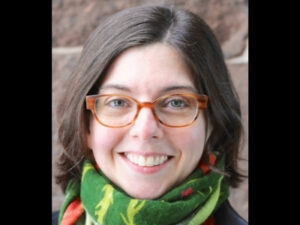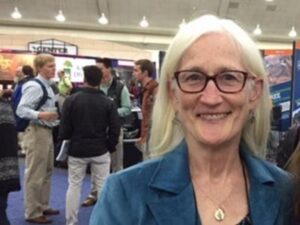
Courtney Fullilove is an associate professor of history who teaches U.S. social history, environmental history, and the history of science and technology in global perspective at Wesleyan.

Courtney Fullilove is an associate professor of history who teaches U.S. social history, environmental history, and the history of science and technology in global perspective at Wesleyan.

Suzanne O’Connell is the Harold T. Stearns Professor of Earth Science at Wesleyan. She studies Antarctic paleoclimate using marine sediment cores from IODP (International Ocean Discovery Program) in order to understand how Antarctica has changed in the past, information that will help researchers to understand and model future climate change. In fall 2021 she is teaching CIS221/Research Frontiers in Sciences and E&ES497/Senior Seminar.
 Each year, our COE Think Tank brings together Wes students and faculty from across the university, plus a noted outside scholar, for a yearlong conversation on a topic of vital environmental importance. This year’s focus: visualizing environmental change. Read on to discover how our three student fellows will explore the topic in their work. This year’s student fellows include Olivia Baglieri ’22, Dylan Judd ’22, Skye Hawthorne ’22, Lilley Gallagher ’22 and Mackenzie Sheehan ’22.
Each year, our COE Think Tank brings together Wes students and faculty from across the university, plus a noted outside scholar, for a yearlong conversation on a topic of vital environmental importance. This year’s focus: visualizing environmental change. Read on to discover how our three student fellows will explore the topic in their work. This year’s student fellows include Olivia Baglieri ’22, Dylan Judd ’22, Skye Hawthorne ’22, Lilley Gallagher ’22 and Mackenzie Sheehan ’22.
The COE shares faculty from across departments and programs at Wesleyan, including government, history, art, dance, computer science, English, philosophy, environmental science, biology, African American studies, physics, classical studies, chemistry, Science in Society, theater, religion, economics, archaeology, and more.
Jennifer Raynor is assistant professor of economics at Wesleyan. Her research focuses on natural resource management, with an emphasis on measuring the unintended consequences of rules and regulations. In fall 2021, she is teaching ECON210/Climate Change Econ and Policy. She joined the faculty of the COE in spring 2021.
The development of glacial lakes from receding glaciers, contained by either terminal moraines or bedrock, is commonly linked with global warming trends that have occurred since the end of the Little Ice Age (LIA). Such lakes are prone to sudden and catastrophic drainage, popularly known as glacial lake outburst floods (GLOF). Although GLOFs continue to dominate the focus of both peer reviewed and popular media articles alike, a range of other cryospheric processes and hazards exist that are in need of further research attention and mitigation technologies.
Join Alton C. Byers, PhD, the 2021-22 Menakka and Essel Bailey ’66 Distinguished Visiting Scholar in the College of the Environment and a member of our 2021-22 COE Think Tank, for Recent Glacier-Related Flood Events in High Mountain Environments, a multimedia discussion of englacial conduit floods, periodic and recurrent flooding of lakes created by glacier- or ice-dammed lakes, permafrost-linked rockfall and debris flows, and earthquake-linked glacier floods. This event is the latest in the COE’s annual Where on Earth Are We Going? seminar series, sponsored by the Robert F. Schumann Institute of the College of the Environment. The event is a direct tie-in with this year’s COE Think Tank theme of visualizing environmental change. The event takes place Saturday, October 30, 2021, from 11 am to noon at Exley Science Center (Room 150) on the Wesleyan Campus.

Each academic year, the COE gathers a small group of Wesleyan faculty members, a scholar of prominence from outside Wesleyan, and undergraduate students into a year-long academic think tank on a critical environmental issue. The aim of the COE Think Tank is not only to generate a deeper understanding of the thematic issue, but also to produce scholarly works that will influence national/international thinking and action on the issue. The Think Tank theme for 2021-22 is visualizing environmental change.
Our 2021-22 COE Think Tank faculty fellows are: Suzanne O’Connell, the Harold T. Stearns Professor of Earth Science; Jennifer Raynor, assistant professor of economics; Courtney Fullilove, associate professor of history; Helen Poulos, adjunct assistant professor of environmental studies; Antonio Machado-Allison, university professor in the College of the Environment; and Alton C. Byers, senior research scientist at the Institute of Arctic and Alpine Research (INSTARR) at the University of Colorado at Boulder and this year’s Menakka and Essel Bailey ‘66 Distinguished Visiting Scholar in the College of the Environment. Olivia Baglieri ’22, Dylan Judd ’22, and Skye Hawthorne ’22 will also be joining the Think Tank as student fellows this academic year.

Elizabeth A. Byers is the 2021-22 visiting scholar in the College of the Environment. She is a senior wetland scientist with the West Virginia Department of Environmental Protection. During the last five years at WVDEP she has worked to create and implement an assessment tool that will become the law of the land in West Virginia in early 2022. Prior to joining DEP, she worked for 11 years as a Natural Heritage Ecologist and for 20 years as a hydrologist and conservationist in the Himalayas, East African rift, Andes, Rocky Mountains, and Appalachians. In 2020, Elizabeth published the first-ever field guide to the flora and ethnobotany of Mount Everest National Park.